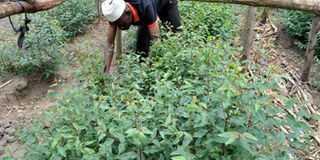Protecting crop varieties boosts plant breeding, benefits farmers

If a farmer improves a plant variety and it meets the criteria, he or she will enjoy the rights and benefits of plant variety protection. PHOTO BY RACHEL MABALA
Protection of new varieties of plants is an important aspect of the agriculture sector. Among others, it facilitates access to improved plant varieties, a key input in farming through protection of the breeder to exclusively benefit from commercial exploitation of their improved variety.
This motivates the breeder to invest in research for new varieties, which are eventually made accessible to farmers through the system of plant variety protection.
Member countries of African Regional Intellectual Property Organisation (Aripo), including Uganda, have adopted a protocol on the protection of new varieties of plants. This shall be known as the Arusha Protocol on the Protection of New Plant Varieties (Plant Breeders’ Rights).
Impacts on wellbeing
The protocol was adopted by Aripo’s Council of Ministers, which is chaired by Uganda’s Minister for Justice and Constitutional Affairs, Kahinda Otafiire.
Most of these countries, which are member states of Aripo, rely heavily on the agricultural sector.
In Uganda, for example, agriculture employs 72 per cent of the workforce. This, therefore, calls for increased support and focus to the agricultural sector since it impacts on the wellbeing of the entire population.
It has been the objective of the government to improve production and productivity in the sector through, among other strategies, increasing access to affordable inputs including seeds as well as attracting investments in the sector.
Right and opportunity
For Uganda to realise its potential as a regional food basket, protection of new varieties of plants regionally is key.
Through the plant variety protection system, a breeder of a new plant variety once protected, has a right and opportunity to become the exclusive marketer of the plant, or license it to others.
To qualify, however, for that exclusive right, the plant variety must be new, distinct, uniform and stable.
A variety is new only if it has not been commercialised for more than one year in the country of its protection while it is considered distinct if it differs from all other known varieties.
A plant variety is uniform if its characteristics are consistent from plant to plant within the variety while it is considered stable if the plant characteristics are genetically fixed and therefore remain the same from generation to generation, or after a cycle of reproduction in the case of hybrid varieties.
Important incentive
In spite of agriculture being the driver of most economies, Africa has experienced perennial food deficits that have resulted in hunger, malnutrition and diseases.
Aripo member states recognise that plant variety protection is an intellectual property tool that can be purposefully utilised to promote agricultural development in Africa.
The protocol, therefore, will be an important incentive for breeders to be innovative by developing new and improved varieties of plants in order to promote sustainable agriculture in their respective countries.
This, thereby, improves productivity of farmers, and competitiveness of the agricultural industry that will ensure food security and better standards of living for the farmers.
Encourage innovation
The protocol is also intended to complement the national plant variety protection systems. It shall come into force after twelve months from the date that four member states have ratified and deposited the instruments of ratification/accession.
While officiating at the event, Vice President of Tanzania, Dr Mohammed Gharib Bilal, asked that African economies to encourage innovation in agriculture for agricultural development.
“It is essential that African countries develop and diffuse innovative and climate-proof solutions, such as seeds of improved varieties that are more tolerant to rainfall varying patterns, drought and floods, to facilitate the growth of small and large commercial farming enterprises,” he said.
The writer is registrar general, Uganda Registration Services Bureau




